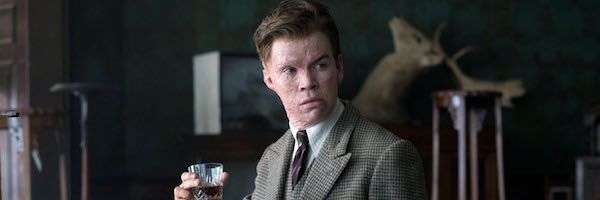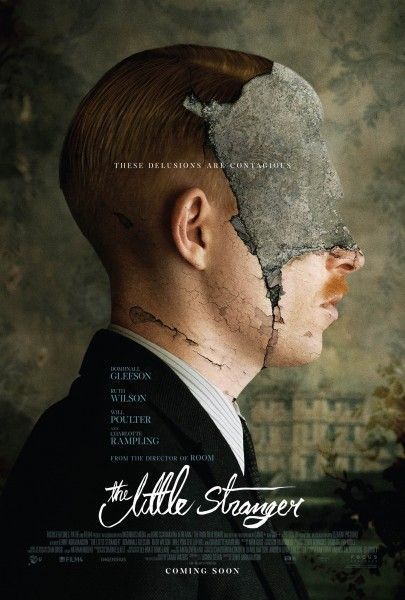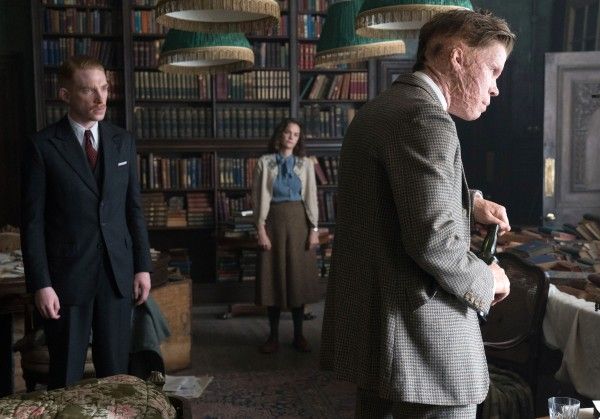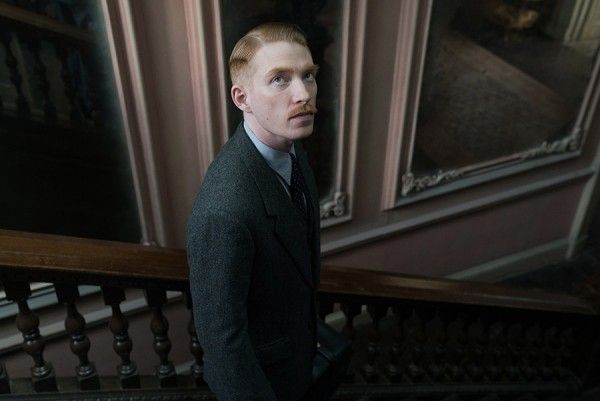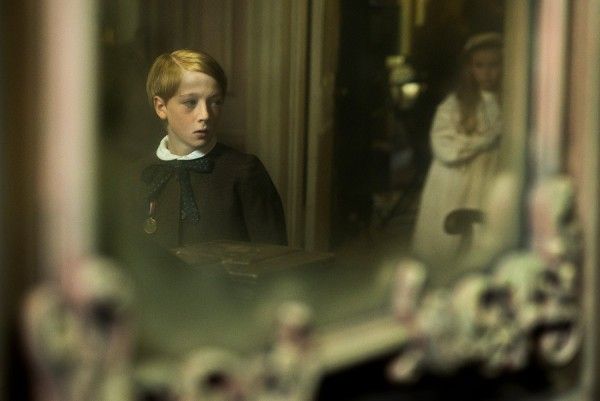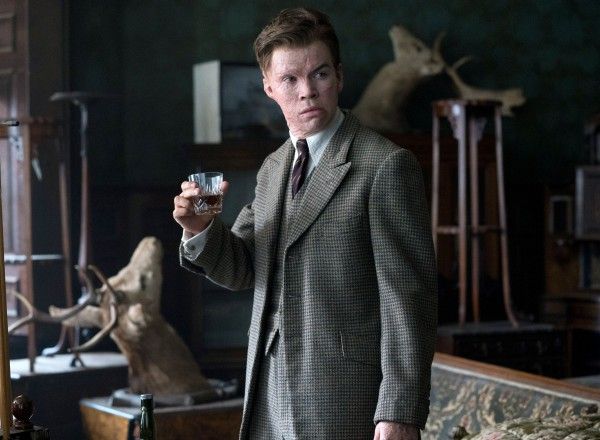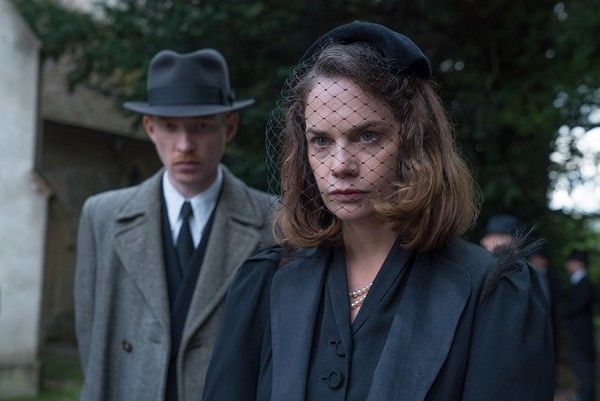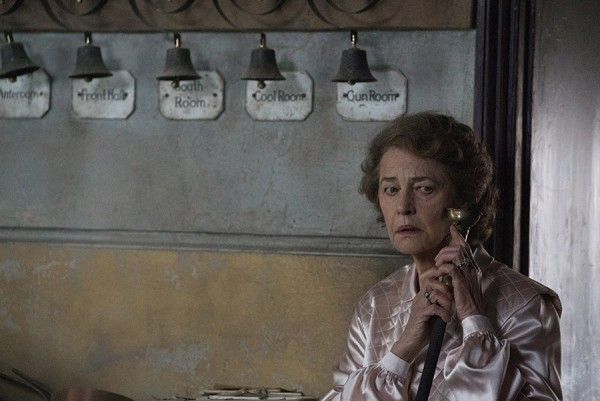From director Lenny Abrahamson (Room, Frank) and screenwriter Lucinda Coxon, and adapted from the book of the same name by Sarah Waters, The Little Stranger tells the story of what happens when Dr. Faraday (Domhnall Gleeson) is called by the Ayres family to Hundreds Hall, where his mother once worked, to attend to a patient. The house and grounds of the vast estate has suffered and is now dilapidated from neglect, which adds to the creep factor, as he begins to wonder if mother (Charlotte Rampling), son (Will Poulter) and daughter (Ruth Wilson) are being haunted by something more supernatural in nature.
While on location in Hungary, where he’s shooting his next film, actor Will Poulter jumped on the phone with Collider for this 1-on-1 interview to chat about the unsettling vibe of The Little Stranger, how imposing it was to work in an estate like the one in the film, the ambiguity of the storytelling, and going through the process of putting on the make-up and prosthetics. He also talked about what drew him to Midsommar, director Ari Aster’s follow-up to Hereditary, and why he fell in love with his character, as well as what he looks for in a project, and his long dream list of directors that he’d like to work with.
Collider: This movie creeped me out, in the best way possible, and I mean that as a compliment, so thank you for that.
WILL POULTER: Oh, good! I’m glad to hear that.
I love movies that have an eerie, creepy vibe to them, that bothers you and makes you feel unsettled for hours after watching it. It’s much more fun than having that be in your face.
POULTER: That’s cool. I agree. It’s not that I don’t think those kinds of stories can’t be skillfully executed, but I’ve always been drawn more to those films that disturb and create a sense of unease. That’s probably true of The Little Stranger, and that’s credit to the way that (director) Lenny [Abrahamson] ended up handling the movie. After you’ve finished watching it, the feeling of unease lasts and it bleeds into life outside of the movie theater, afterwards, for quite an unsettling amount of time. I felt that way watching it, too.
It seems as though nothing good ever comes from people living in isolation in an old, crumbling manor. How imposing was it to walk into and work in an estate like that?
POULTER: I would probably say that The Little Stranger was the closest thing that I’d ever done to horror, and I always wondered, if ever I was going to work on a film that did have slightly scary or disturbing elements to it that were borrowed from the horror genre, would I, myself, be horrified? Would I find it too scary? There was something really disturbing in having discussions about what was going on in that house. There was actually something genuinely unsettling about being in there and playing through the dialogue. And the house itself did begin to take on a creepy character. We felt that. We were very cognizant of that, during the shooting process. It actually informed all the choices that we made. That house is a principal character in the story, and that’s true of the book, as well.
Because there are so many different things at play in this story, and you aren’t really sure if what’s going on could be supernatural, what impression did you get, the first time that you read the script?
POULTER: I loved the fact that it wasn’t easily definable as belonging to one single genre. What I liked about it was that I saw elements of pure drama, elements of mystery, and thrilling aspects to it. And then, there are the supernatural elements that cause the movie to lean more towards the classic horror genre. Truthfully, I was very excited about the fact that all of these things could be combined in a really beautifully synchronized way. That’s what drew me in. What’s interesting with the character of Roderick, in particular, is that he is a character who I think is highly disturbed because he’s unable to explain exactly what’s happening to him, and everything that has happened to him up, until the point that we meet him in the story. If you were going to take the highly scientific perspective on it, this is a young man who suffered a terrible accident, and it was just simply an accident. He’s a burn survivor, and following that experience, he has some PTSD, some psychological trauma, and he’s an alcoholic. If you’re to look at it through the lens which rests on a lot of the other action that surrounds him, potentially that wasn’t an accident. How far back do the supernatural elements occur? Is he simply psychologically unreliable, or are there beings in his mind? Has he been infected by the supernatural, in the way that other parts of his life have? That was interesting to me. His disturbia is dismissed as war shock, which is quite frustrating for him because he seems to be one of the first people to really call out what happened in the house as being supernatural, as opposed to just evil explained by science.
What was it like to go through the process of putting on the make-up and prosthetics, and then acting through the outside appearance?
POULTER: It was interesting. I’ve got to be honest, that was a major part of the challenge, for me. I have quite high claustrophobia. Having done sketch comedy, very, very early on in my career life, I developed a phobia of spirit gum. But I worked with one of the most talented people, in the shape of Barrie Gower, that I’ve ever come across. Barrie and his team were just phenomenal, and I just felt incredibly lucky to work with them. We spent about five to six hours, every morning, with each other in the chair, and they made every day a real joy for me, or as comfortable and as joyful as it could be. I listened to so much music, over a decent period of time. It was really helpful, as far as feeling like I was Rod and trying to portray him. It was a very necessary part of constructing that character.
How long did it take to get all of that removed, once you were done?
POULTER: It was five to six hours putting it on, and I believe it was an hour to de-rig. Funnily enough, I actually found that hour-long de-rig to be harder than the five or six hours of putting it on, which sounds nuts, but it was just that the nature of the de-rig was very uncomfortable. But I was fortunate enough to work with the most incredibly talented team, in that department. They’re literally the best in the world, so I felt very fortunate to be in their hands.
You’re currently working on Ari Aster’s follow up to Hereditary, aren’t you?
POULTER: Yes, that’s correct. I’m doing Midsommar.
What was it about that project that made you want to be a part of it?
POULTER: It’s hard to talk about without giving away information that I’m trusted to keep secret, but I couldn’t be more of a fan of Ari and his style of working. He’s an unbelievably talented writer. I’m a month into the shooting of this project, and I think he’s an equally good director. He’s just phenomenal. It was really the conversations with Ari, in conjunction with reading the script, that made me wanna do it. I fell in love with my character, on the page. He’s got such an incredibly insightful perspective on human behavior. Without speaking for Ari, I think the fact that it’s framed by the horror genre is almost accidental. He’s just an amazing observationalist, and he’s able to bring to light true, devout human behavior, in a way that happens to be both funny and horrifying, in the context of his first film. I think he’ll do the same thing with Midsommar, just in a broader range of life. I think Midsommar is gonna be even better than Hereditary.
At this point in your career, what do you look for in a project? Does it always start with the script itself, or are there other factors that come into play?
POULTER: It’s interesting, that checklist is evolving. Now more than ever, I’m conscious of the social application of my work and what the films that I’m involved with are saying, outside of the movie theater, and how the experience of watching it is gonna inform and affect audiences, beyond the time that they’re watching the film. Honestly, I’m wanting to represent characters that force me to transform and challenge me. I really like the challenge of staying away from home, and variety, and trying to demonstrate versatility. That is a fun exercise for me. And then, it’s about working with creatives that I really respect. Of late, I’ve been so lucky to work with Lenny Abrahamson and with Ari. I’ve just had the good fortune of being able to work with some directors that I really, really admire, so I hope I’m able to continue to do that.
Are there any directors on your personal dream list that you would love to get the chance to do a project with?
POULTER: My list is embarrassingly long. I’m a fanboy of lots and lots. Right now, it’s Ari. The moment that I read Midsommar, I knew I wanted to work with him, and that feeling was compounded by my love of Hereditary. I feel like I’m really achieving one of those desires, right now. It’s not lost on me, how lucky I am to be working on Midsommar. And I was a longtime fan of Lenny. Lenny was someone who was on my dream list of directors, for awhile. I love What Richard Did. I was a huge fan of Frank. Room was exceptional. I wanted to do whatever Lenny was doing next, and I’m just very grateful that he gifted me with the very generous role that is Rod. It was one of the hardest and most rewarding experiences that I’ve had, and working with Lenny was such a treat.
The Little Stranger opens in theaters on August 31st.

